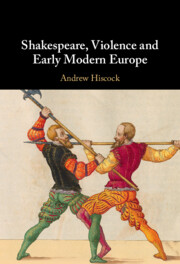‘Hiscock possesses an insightful eye for the nuances of narratives about transnational violence and their complex relationships with literary texts - particularly Shakespeare's history plays. His perspective is impressively broad, exploring how ideas about warfare have been repeated, re-formed, and interpreted in sources from England and the Continent from the seventeenth century to the present … Shakespeare, Violence and Early Modern Europe adds considerably to how we think about violence and war in the period, in Shakespeare's plays, and in our own time.’
Matteo Pangallo
Source: Shakespeare Quarterly
‘Throughout, Hiscock's study is enrichingly contextualised by excerpts from primary sources (in their original languages and translated into English) … A further strength lies in how the book's arguments are not only underpinned by literary criticism and historical research, but also informed by judicious use of works by philosophers... Hiscock's Shakespeare, Violence and Early Modern Europe is a solid and thoughtful contribution to early modern literary and cultural studies, commendably demonstrating the value of attending to the intersections between Shakespearean drama, Elizabethan politics, and the theatres of war across the continent.’
Edel Semple
Source: Review of English Studies
‘There was a deep ambivalence towards military violence and the practice of soldiery during the last years of Queen Elizabeth I’s reign … Andrew Hiscock’s Shakespeare, Violence and Early Modern Europe explores this ambivalence. Over the course of six interesting and thoroughly researched chapters, filled with a wealth of valuable quotations both from British and European theorists of war in the early modern period and from modern scholars of violence, Hiscock documents the complex and conflicted attitudes that the early moderns held towards both warfare and those who practised it.’
Rebecca Yearling
Source: The Spenser Review
‘Shakespeare, Violence and Early Modern Europe is another major study by Andrew Hiscock, one of our leading commentators on early modern cultural and intellectual history … [It] marks a significant contribution to our collective understanding of how violence figured in early modern cultural debate, and how Shakespeare's creative engagement with English history … helped to introduce and sustain such debate …’
Rory Loughnane
Source: Modern Language Review
‘With extraordinary range of reference, Andrew Hiscock’s Shakespeare, Violence, and Early Modern Europe examines early modern debates about the functions of violence in the construction of national identity and national memory from both English and continental perspectives. Though assembled around readings of Shakespeare’s history plays, the book encompasses discussions of warfare, ambition, territorial expansion, militarization, and the uses of history, impressively documented in English and Continental print culture from the sixteenth to the eighteenth centuries.’
Amanda K. Ruud
Source: Renaissance Quarterly
‘Smart, well researched, and offering a unique view of Shakespeare's two history tetralogies, Shakespeare, Violence and Early Modern Europe examines the context in which the personal and political violence of Shakespeare's history plays were received and understood, and also the status and function of violence as represented on the English Renaissance stage and in the social mechanisms of early modernity. … Through close readings of the plays, Hiscock opens them up, proposing that Shakespeare's cultures of war actually disclose hitherto occluded conditions of being, knowing, telling, and withholding.’
K. J. Wetmore Jr.
Source: CHOICE



